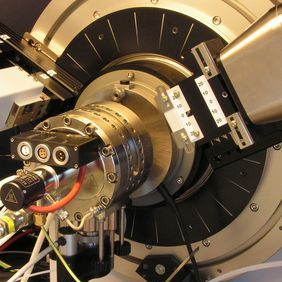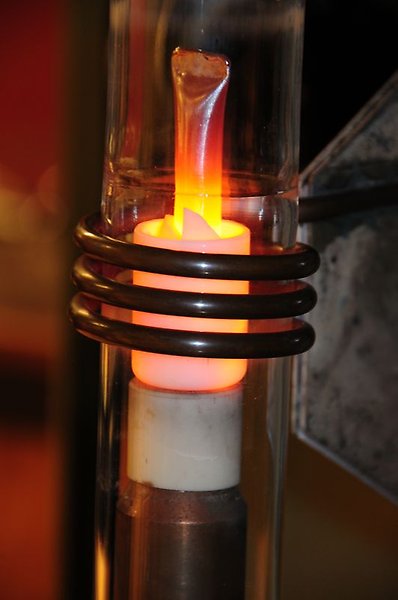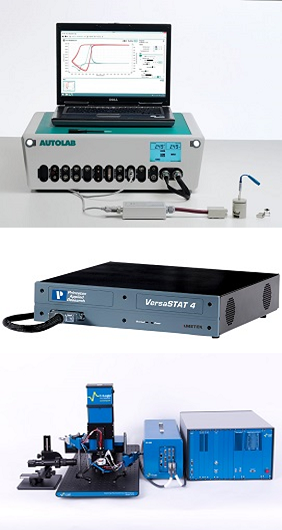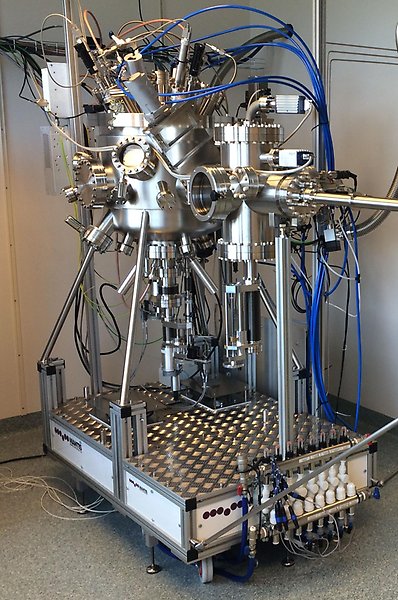Research Infrastructure

Our research infrastructure
Within the inorganic chemistry research programme we have a large amount of local infrastructure and research equipment to facilitate our research on new inorganic materials. In particular we are responsible for the the X-ray laboratory, is local infrastructure for X-ray diffraction and fluorescence open for all researchers at Uppsala university. We also provide facilities for high-temperature synthesis through our Furnace lab. Additionally the research programme has substantial amount of other research equipment, where we especially would like to highlight the Electrochemistry and corrosion lab.
Besides the above mentioned infrastructure, which is managed by the inorganic research programme, we do also have access to, and routinely use, a number of local research infrastructures:
- µFAB Uppsala, which has state-of-the-art instrumentation for material analysis.
- The Tandem Laboratory, where we perform ion beam analysis.
- The Ångström workshop, for construction and modification of all kind equipment.
Furthermore, researchers from inorganic chemistry also routinely iuse large-scale research infrastructures such as synchrotron and neutron sources. More info on these kinds of methods are found at our page on advanced materials characterisation.
X-ray laboratory
The Inorganic chemistry research program has the most advanced x-ray laboratory for powder and thin film diffraction in Sweden. Powder diffraction is used for phase and structure analyses, additional cambers for high and low temperature in-situ investigations are also available.
Grazing incidence XRD (GIXRD) are used to enhance the diffraction from surface layers. Many thin films contains texture and residual stress, by using poly capillary x-ray optics, high intensity can be obtained for this type of measurements. Epitaxial films can be characterized with respect of cell parameter and stress with “reciprocal space mapping”.
The laboratory is also used as Ångström laboratory common resource. We also perform commissioned analyzers for external companies/organizations.

Furnace lab
The furnace laboratory offers excellent capabilities to synthesize and process ceramic and metallic alloy samples. This includes the weighing, milling, mixing and compaction of raw materials as well as sealing in quartz or metal ampoules for annealing. Heat treatments are capable at different temperatures and atmospheres using the many furnaces available. Thermal analysis is routinely used to study the thermal events in solid samples as it is heated Specimen preparation for microstructural analysis can be reproducibly performed using automated cutting and polishing equipment.
Contact: Prof. Martin Sahlberg and Dr. Pedro Berastegui

Electrochemistry and corrosion lab
The electrochemistry and corrosion lab of the Inorganic research program is equipped with three different potentiostats/galvanostats suitable for several electrochemical methods:
- AUTOLAB302N (Metrohm) with a potential range of ±10 V and 1 A to 10 nA current range, combined with electrochemical impedance spectroscopy (10 µHz - 1 MHz) (https://www.metrohm.com/en/products/a/ut30/aut302n_s.html)
- VersaSTAT 4 (AMETEK / Princeton Applied Research) with a potential range of ±12 V and ±2 A (standard) down to 4 nA current range combined with electrochemical impedance spectroscopy (10µHz to 1MHz). (https://www.ameteksi.com/products/potentiostats/single-channel/versastat-series/versastat4)
- M470-SP-300 (BioLogic) potentiostat/galvanostat with a potential range of ±10 V and 1 A to 100pA current range, combined with electrochemical impedance spectroscopy (10 µHz - 3 MHz) which can perform Scanning Electrochemical Microscopy (SECM), Scanning Droplet Cell (SDC) and ac impedance spectroscopy, suitable for local electrochemical measurements and trace electrochemical features along a compositional gradient. (https://www.biologic.net/products/m470/)
Contact: Prof. Leif Nyholm

Other research equipment
Besides the above mentioned local infrastructur, the inorganic research programme has a large selection of equipment to aid the synthesis and characterisation of inorganic materials.

Contact
- If you have questions about our research, you are welcome to contact the programme professor Professor Martin Sahlberg.
- Martin Sahlberg
